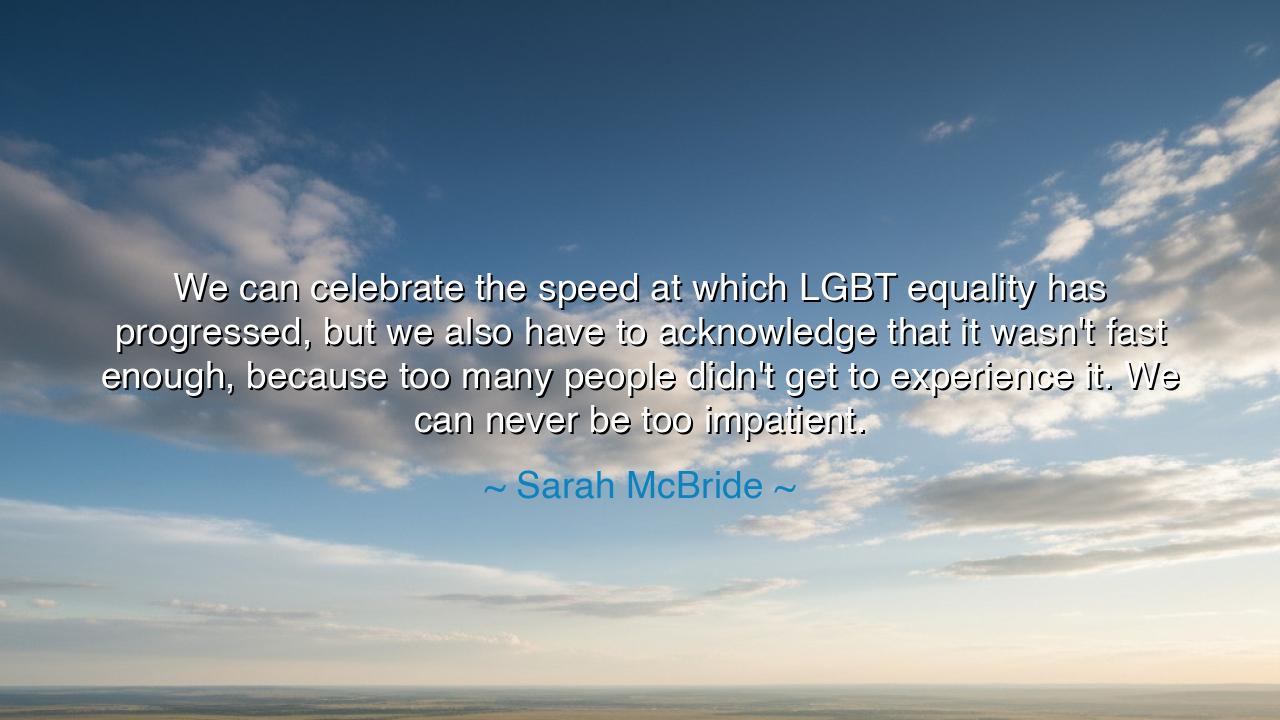
We can celebrate the speed at which LGBT equality has progressed
We can celebrate the speed at which LGBT equality has progressed, but we also have to acknowledge that it wasn't fast enough, because too many people didn't get to experience it. We can never be too impatient.






"We can celebrate the speed at which LGBT equality has progressed, but we also have to acknowledge that it wasn't fast enough, because too many people didn't get to experience it. We can never be too impatient." With these powerful words, Sarah McBride calls us to a dual awareness—the recognition of the progress made in the fight for LGBT equality, while also acknowledging the unfinished work that remains. McBride’s words remind us that victories in the fight for equality cannot be celebrated with complete satisfaction until every individual has the right to experience that freedom and dignity. The struggle for LGBT rights is ongoing, and though strides have been made, we must continue to push forward, undeterred by the slow pace of change, knowing that every step counts.
In the ancient world, the idea of progress and justice was often seen through the lens of slow, painstaking labor. The Greeks believed in the concept of virtue as something that was achieved not in a moment of glory, but through years of practice and moral striving. Socrates taught that true wisdom came from constant questioning and reflection, never from the pursuit of quick fixes. Similarly, in the struggle for LGBT equality, McBride speaks to the idea that, while progress has been made, the journey towards full justice cannot be rushed. It requires patience and persistence, qualities that were celebrated by the great thinkers of the past.
One of the most heart-wrenching examples of this struggle comes from the AIDS crisis of the 1980s, which ravaged the LGBT community before public understanding and medical intervention could catch up. Many lives were lost in the early years of the epidemic, with few receiving the medical care they needed. Activists, like those in ACT UP, fought tirelessly to bring attention to the epidemic and push for research and treatment. These warriors, though they witnessed the progress of AIDS awareness in later decades, also knew the painful truth that too many suffered and died before real help arrived. In their struggle, they embodied McBride's call: the progress was necessary, but it was too slow for those who did not live to see it. The progress made in the fight for LGBT rights was never fast enough, because it never came quickly enough to save those who needed it most.
McBride’s reflection also points to the importance of patience and long-term commitment in movements for social change. Dr. Martin Luther King Jr., in his speeches and writings, often spoke about the need for patient perseverance in the fight for racial equality. His famous letter from a Birmingham jail, written in 1963, stated that “justice too long delayed is justice denied.” King, too, understood that the road to equality was not an immediate one, but that each battle, even when it seemed too slow, was part of a larger movement. Just as King’s work was not achieved overnight, the journey toward LGBT equality continues to require relentless effort, even in moments when change seems to move too slowly.
In the modern day, McBride’s words ring especially true in the context of the LGBT rights movement that continues to evolve, especially with regard to the rights of transgender individuals. While we celebrate the legalization of same-sex marriage in countries like the United States, many transgender people still face daily discrimination, violence, and lack of legal protections. The fight for LGBT equality is far from over, and as McBride wisely reminds us, we cannot be satisfied until everyone—regardless of their gender identity or sexual orientation—can fully experience the equality and freedom that they deserve.
The lesson to be drawn from Sarah McBride’s words is one of both celebration and accountability. We must celebrate the progress made, but never lose sight of the unfinished work that still lies ahead. Every step forward is a victory, but it is not a complete victory until every individual, regardless of who they are or whom they love, has access to the full spectrum of rights and dignity. The fight for equality is not one that can be rushed or dismissed; it is a long, deliberate march toward justice. Our impatience, though natural, must be tempered with a deep understanding that true change requires both time and the collective effort of those who are committed to pushing forward.
In our own lives, let us take McBride’s message to heart. Celebrate progress, yes, but never forget those who are still waiting for their rightful equality. In our actions, in our advocacy, and in our commitment to justice, let us remember that patience and persistence are as important as urgency. The road to equality may be long, but it is a road worth traveling, and each step forward—no matter how small—paves the way for future generations to walk with pride and freedom. We cannot afford to slow down or turn away; the fight for equality continues, and each of us must do our part to make sure it arrives for everyone, without delay.






AAdministratorAdministrator
Welcome, honored guests. Please leave a comment, we will respond soon